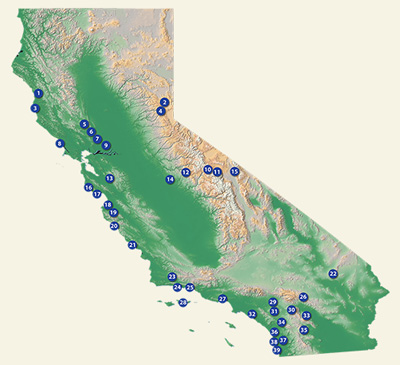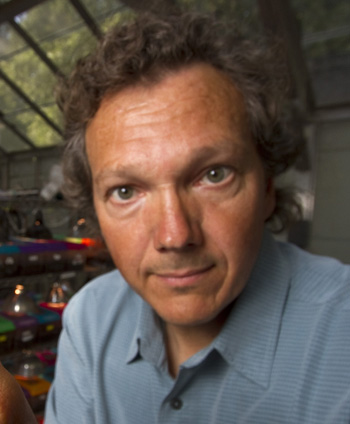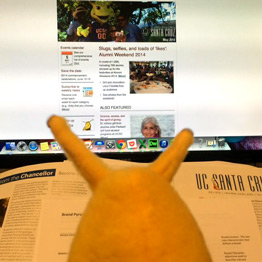By Tim Stephens
$1.9 million grant from new UC President’s Research Catalyst Awards will fund UC-wide Institute for the Study of Ecological and Evolutionary Climate Impacts
 This map shows the locations of the 39 reserves in the UC Natural Reserve System.
This map shows the locations of the 39 reserves in the UC Natural Reserve System.UC Santa Cruz researchers have developed an ambitious plan to use the UC Natural Reserve System (NRS) to detect and forecast the ecological impacts of climate change in California. Their proposal to establish a UC-wide Institute for the Study of Ecological and Evolutionary Climate Impacts (ISEECI) has received $1.9 million in funding, the largest of the new President’s Research Catalyst Awards announced by UC President Janet Napolitano on December 10.
UC Santa Cruz biologist Barry Sinervo will lead the institute, which involves all of UC’s nine undergraduate campuses. The NRS is the world’s largest system of university-administered natural reserves, offering a powerful opportunity for scientists to study how climate change will affect California ecosystems and the ecosystem services that people rely on, he said.
“We are going to be creating a large network of UC climate researchers and using the NRS system as a climate change observatory for biotic systems,” said Sinervo, a professor of ecology and evolutionary biology who has led studies documenting the effects of climate change on animal populations around the world. He worked with Laurel Fox, also a professor of ecology and evolutionary biology at UCSC, to develop the proposal.
 Barry Sinervo, professor of ecology and evolutionary biology at UC Santa Cruz, will lead the Institute for the Study of Ecological and Evolutionary Climate Impacts. (Photo by J. MacKenzie)
Barry Sinervo, professor of ecology and evolutionary biology at UC Santa Cruz, will lead the Institute for the Study of Ecological and Evolutionary Climate Impacts. (Photo by J. MacKenzie)“Working simultaneously across the network of reserves creates much greater returns than the sum of the individual parts,” Fox said. “Beyond studying the responses of different habitats in California to environmental change, we can now explore the linkages between them at large spatial scales, with the goal of understanding and potentially mitigating future climate impacts on a state-wide level.”
Coordinated approach
ISEECI researchers will assemble historical records, establish a new system for data collection, and conduct experiments and long-term monitoring studies across the state. Although there have been many in-depth studies documenting climate impacts, they have largely been done independently, with results that are difficult to compare among studies. ISEECI will pursue a coordinated approach across broad geographic scales. Researchers will develop models to predict future changes to ecosystems and potential impacts on ecosystem services that might threaten the capacity of Californians to adapt to a changing climate.
“A new approach to research is needed to assess the scope of biotic changes, to devise suitable conservation and restoration responses, and to advise policymakers and the public on how to adapt to and mitigate potential threats to natural ecosystems, agriculture, water resources and sustainable development,” Sinervo said. “For Californians, the most important product will be a better understanding of how we can adapt in the face of shifts in critical ecosystem services.”
The NRS offers secure study sites where long-term research and experiments can be undertaken by UC faculty and students. The system has many unique features that are unavailable at other reserves or national parks, including:
- proximity to a diverse and ecologically-sophisticated population of university students, volunteer naturalists, docents, and local educators who can engage citizen-scientists and education programs;
- availability of local meteorological stations currently recording high-resolution climate data;
- ability to sample and archive datasets that can be made available online for public access and analysis; and
- collective representation of the range of terrestrial and near-shore marine ecological zones of California.
ISEECI is one of five newly funded projects designed to stimulate UC research in areas that could benefit California and the world. The President’s Research Catalyst Awards will channel $10 million over three years to fund research in areas of strategic importance, such as sustainability and climate, food and nutrition, equity and social justice, education innovation, and health care.
“The President’s Research Catalyst Awards will spur UC research and offer our faculty and students new opportunities for cross-campus, multi-disciplinary collaboration,” Napolitano said. “We want to support research endeavors that have real-world impact in areas with critical needs.”



